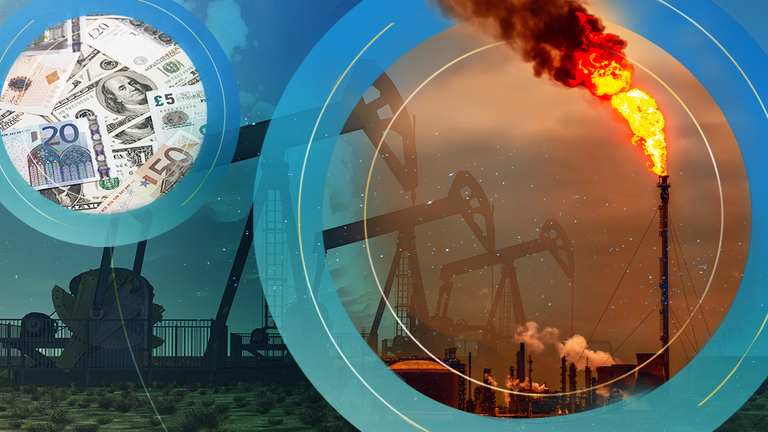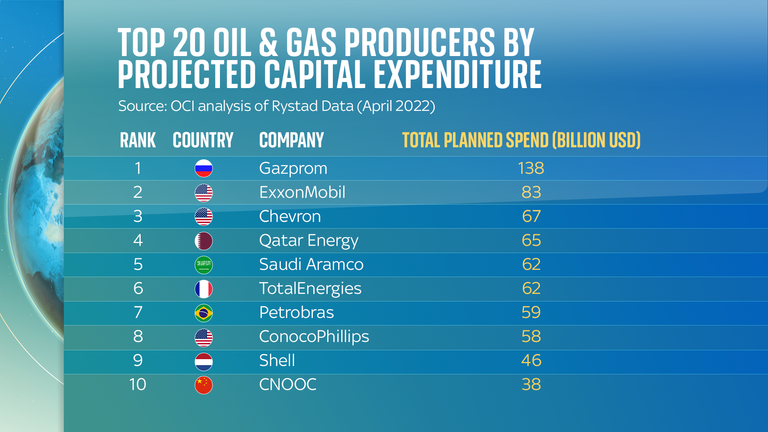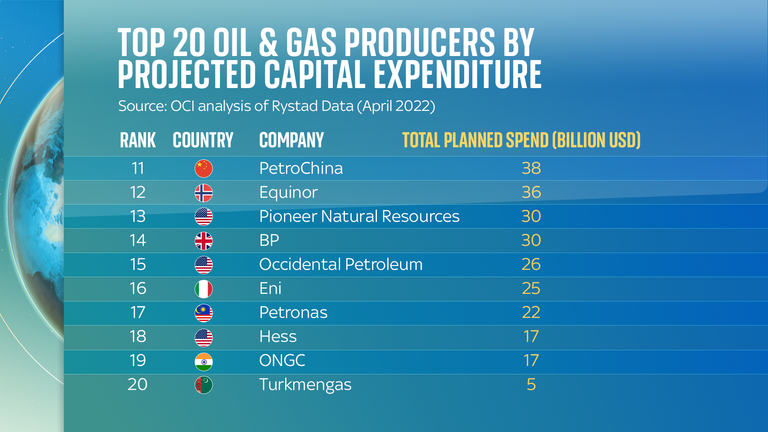Fossil fuels: 20 oil and gas firms who support Paris Agreement projected to spend $932bn on new sites by 2030
All 20 firms have voiced support for the Paris Agreement, but UN scientists warn any new oil and gas sites would put 1.5C Paris goal beyond reach.
Tuesday 12 April 2022 03:29, UK
Just 20 fossil fuel firms including Shell and BP are projected to spend $932 billion (£715 bn) on new oil and gas fields by 2030, according to new research shared exclusively with Sky News.
All the oil majors have pledged support for the Paris Agreement, which commits to limiting global warming to ideally 1.5C above pre-industrial levels - firms who hadn't were discounted from the list.
The analysis from campaigners Global Witness and Oil Change International comes a week after the United Nations (UN) called it "moral and economic madness" to invest in new oil and gas.
UN scientists (IPCC) warned those assets risked becoming stranded by mid-century, and that new fossil fuel projects would tip the world well over the 1.5C Paris target.
Investments from companies that say they are aligned with Paris look "deeply hypocritical" and stand in "stark contrast" with the IPCC's findings, said Global Witness campaigner Barnaby Pace.
Russian state company Gazprom topped the list with a predicted spend of $138bn (£105bn), Shell ranked ninth with $46bn and BP fourteenth with $30bn, according to the researchers' analysis of Rystad Energy data.
The figures cover new oil and gas sites being explored or developed, not those already up and running.
"We aren't ready to stop using oil and gas overnight, but these are investments in new oil and gas fields that will be only coming online in years or decades to come," added Mr Pace.
By the end of 2040, the collective spend is expected to reach $1.5 trillion, the analysis shows.
Clean energy investments by the oil and gas industry accounted for around 1% of total capital expenditure in 2020, according to the International Energy Agency.
ExxonMobil - which ranked second with a projected spend of $83bn - said it planned to invest $15bn in "lower-emissions technologies". These include hydrogen, biofuels, and technology to suck carbon out of the air - which scientists say is necessary and should be reserved for very limited sectors - but not renewable energy, other than to electrify some operations.
Shell expects a gradual decline in total oil production of about 1-2% a year, and plans to invest around £15bn in "low and zero-carbon" energy - including offshore wind and hydrogen - in Britain, representing 75% of their UK investment.
Chevron said oil and natural gas are "critical to ensuring reliable energy for decades" and it was reducing the emissions from the extraction process.
"As the energy transition unfolds, demand for fossil fuels will likely fall and companies must ensure that they... don't sanction high cost products that are not needed and ultimately will fail to deliver a return to their shareholders," said Mike Coffin from financial think tank Carbon Tracker.
That means companies planning on sanctioning new oil and gas projects are "thus effectively betting both on the collective failure to limit warming to 1.5 degrees, and on [the failure of] renewables and technologies such as battery storage to substitute for oil and gas," he said.
The British Government last week sparked criticism when it confirmed in its new Energy Security Strategy it would grant new licences for new oil and gas fields in the North Sea.
Unfortunately, this is what a lot of people have predicted would happen and just makes a farce of the whole COP26 agreement, as usual it is all about money. What will it take to make these people stop?
It is so frustrating and sad that the human race is prepared to go down the road of destruction for money, we are screaming as loud as we can but they can't hear because they have their heads stuck in the sand. I have always thought that prevention is better than cure but we all seem to be on this downward spiral to potential disaster if everyone doesn't do their part.
Just one person can make a difference!
The blog song for today is: " We can work it out" by the Beatles
TTFN







